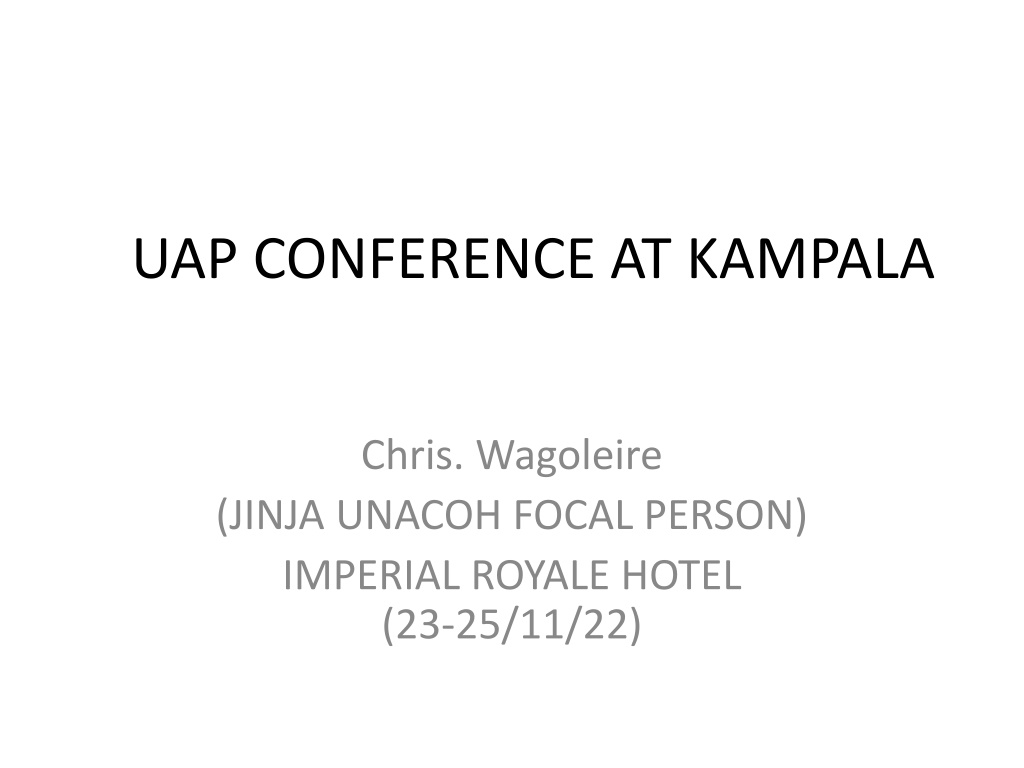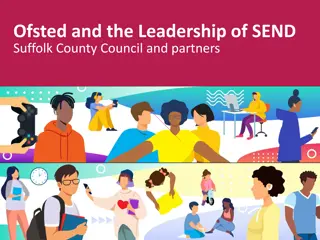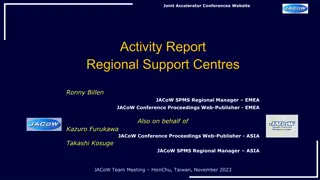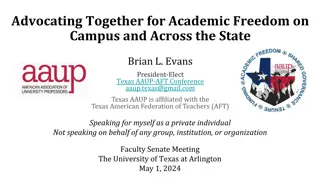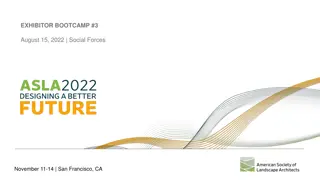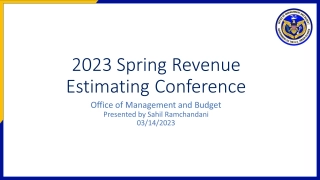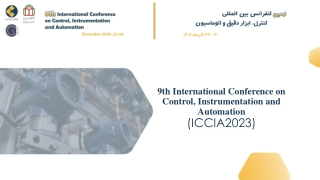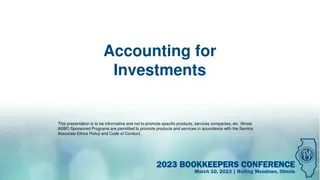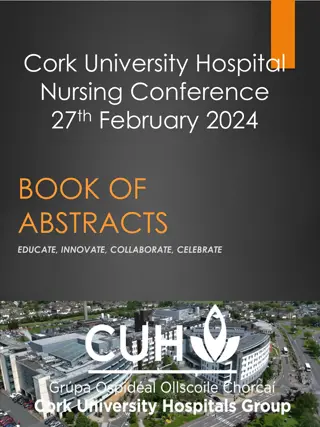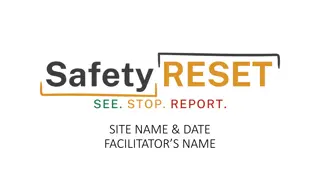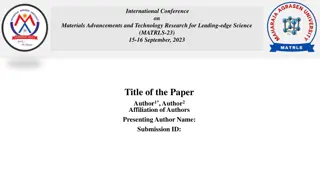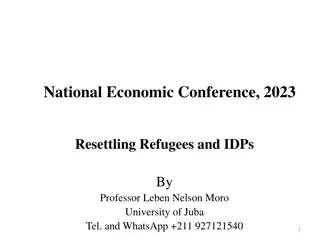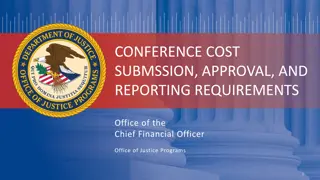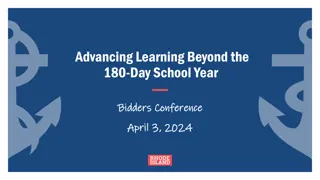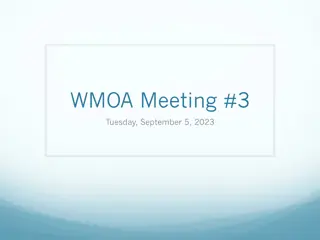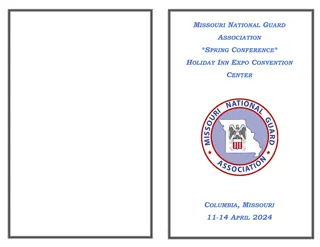UAP CONFERENCE AT KAMPALA
The UAP Conference at Kampala focused on the challenges, opportunities, and recommendations for regulating alcohol consumption at all levels. The presentation highlighted issues such as cultural norms, health impacts, economic consequences, and societal behaviors associated with alcohol. Challenges include gaps in laws, misleading information, societal dependencies, and harmful practices. Recommendations aim to address these concerns and promote a more responsible approach to alcohol regulation.
Download Presentation
Please find below an Image/Link to download the presentation.
The content on the website is provided AS IS for your information and personal use only. It may not be sold, licensed, or shared on other websites without obtaining consent from the author. Download presentation by click this link. If you encounter any issues during the download, it is possible that the publisher has removed the file from their server.
Presentation Transcript
UAP CONFERENCE AT KAMPALA Chris. Wagoleire (JINJA UNACOH FOCAL PERSON) IMPERIAL ROYALE HOTEL (23-25/11/22)
Scope of Presentation Introduction Challenges Facing the Regulation of Alcohol at all levels Opportunities Available for Regulation of Alcohol at all levels Recommendations
Introduction Whereas alcohol is traditionally regarded as a very important beverage, served at all types of ceremonies (whether joyous or sorrowful), alcohol drinking commonly results in alcohol harm that has health and socio-economic outcomes to individuals, families and communities in form of sickness, domestic violence, marital break down, failure to work, poverty, crime, accidents, diseases, high medical expenses, blindness, death, etc.
CHALLENGES: Why is alcohol producing, selling or drinking a problem? The old laws have gaps in regulating alcohol. Some cultural norms are bad. E.g. A newly born infant from the royal clan in Busoga is normally washed with alcohol. So, drinking in that clan is very normal.
Challenges (Why) Contd. Many people resort to such business for lack of alternative income generating ventures or for over-dependency or they drink because of peer pressure. Some people misconceive that since alcohol is an external sanitizer for COVID, so they drink it to sanitize against systemic COVID. Some leaders (in Kikaramoja and Soweto) in Walukuba Division are not exemplary.
Challenges (Why) Contd. They promote opening alcohol joints and drinking. This hinders law enactment/ enforcement. Some packing material gives persuasive, misleading information to the consumers. In early and late stages of alcohol addiction, alcohol consumers fail to avail human basic needs (like food) for their families. School children may drop out of school for lack of school fees. Fighting, violence, crime rates, poverty and marital break down increase.
Challenges (How) How is alcohol producing, selling or drinking a problem? Some producers/ sellers add some toxic substances to alcohol that accelerate people to get drunk in about 5 minutes. This has led to blindness or death in some cases. Alcohol selling business may stall due to accumulated unpaid bills from consumers. Sometimes the dealers become very abusive/ discouraging to the Change Agents,
Challenges (How) Contd e.g. when we say alcohol causes death, people don t quickly see this. Some bar owners regard Change Agents (HWs, CDOs & VHTs) as enemies responsible for the downfall of their bar businesses. Some drunkards with hangovers report to health facilities for treatment creating a nonrealistic claim/ expense. They cannot report to work. Some addicts who need rehabilitation cannot meet the expenses at a Rehabilitation Center.
Challenges (How) Contd Those who agree to leave alcohol producing or selling may need substantial capital for other businesses as an alternative source of livelihood. Some youth consume alcohol retrospectively with other drugs like tobacco or marijuana, which may result into mental disorders that are very expensive to treat let alone the self denial in them. Due to Covid-19 some people ended up eating their financial capital and the businesses stalled.
Challenges (How) Contd Lack of funds for follow up and monitoring esp. now that the project is ending. Some converts who left alcohol drinking need to be continually followed up and counseled. This would help them to avoid resuming to drink, but transport funds cannot be readily got.
OPPORTUNITIES: In attempting to address the above challenges, we have to use our achievements in amplifying the success stories i.e. the opportunities for regulating production, sale or consumption of alcohol. Kakira Sugar Limited (KSL) being the area where the project started in Jinja District in 2012 (for instance) experienced higher benefits in terms of increased production. Therefore, all stakeholders should re-kindle the methods that worked to ensure that the following successes are not reversed:
Opportunities Contd.. A drop in absenteeism and late coming (49.5%). A drop in alcohol consumers (50%). A big drop in accidents at work -60%. Reduction in gender-based violence (80%). Reduction in loss of jobs by 80%. A reduction in failure to complete tasks (50%).
Opportunities Contd.. Over 200 families and groups benefited through financial savings to financial liberty. Better academic performance in schools Drama in some schools on de- campaigning alcohol drinking is on-going. Reduced alcohol-related medical costs. As Kakira Sugar Factory stopped giving out molasses free for waragi making, it is, now, using the molasses to make spirits.
Opportunities (KSL) Contd.. All the above were achieved through: Training a team of trainers (TOTs). Community Mobilization and Sensitization (CMS). One to one dialogues and/or group meetings. Drama in some schools on de- campaigning alcohol drinking. Kakira Sugar Factory Management being willing to review oppressive policies. Individuals affected by alcohol willing to become self aware and determined (SAD).
Opportunities Accruing in 6 S/Cs Given: Reduced alcohol related poverty and reduced cases of child neglect -by 20%, Reduced fights and reduced crime rates - 10% ; Reduced gender-based violence - 50% ; Improved saving culture -40% and Less school drop-outs -by 10%, the opportunity is to intensify CMS, Counseling, and instill an attitudinal change for socio- economic empowerment.
Opportunities in 6 S/Cs Contd Given: Reduced illness/ medical expenses; Better productive businesses; more money from taxes; and Much less drinking in working hours (80%), Authorities should facilitate economic development for the masses. Individuals should become more productive.
Opportunities in 6 S/Cs Contd Individuals and families that left drinking or changed from producing or selling alcohol are being used as a reference point by trainers to emphasize that it is possible to change positively. E.g. 262 formerly alcohol consumers who testify openly having left drinking completely can be used to give testimonies (during community barazas) so as to motivate others to change positively.
Opportunities in 6 S/Cs Contd The over 89 waragi distillers who left the business could change to hands-on-skill jobs. The operators of over 240 alcohol selling joints which are said to have closed due to lack of customers could do alternative businesses. Also more people need to be helped to develop a saving culture thru SACCOs. More people can be assisted to prevent getting alcohol related accidents.
Opportunities in 6 S/Cs Contd Many former alcohol addicts in Bugembe left drinking thru CMS & SAD. The estimated amount of alcohol consumed per month in their area, Leaders say, it has reduced from about 400 (20 liter) jerry cans to 150 jerry cans of alcohol consumed per month. These people should now form SACCOs to get funding under the Parish Development Model.
Opportunities in 6 S/Cs Contd Model villages selected in each of the operational sub-counties/ town councils or Walukuba Division are assisting VHTs through team work to help, reduce alcohol harm tagged to alcohol production, selling or consumption. Role out the best practices e.g. Not sending children to sell or to buy alcohol. -Over 40 people doing alternative businesses like: liquid soap making, tailoring, selling clothes, etc.
Opportunities in 6 S/Cs Contd We thank UNACOH and all other stakeholders for having run this project in Jinja for, now: There is better interaction with communities There is better performance by men. CDOs report having much fewer cases of Family Conflicts, Child Neglect and Crime Rates generally. The ban of small sachets of polythene packed alcohol reduced accessibility to alcohol.
